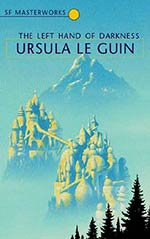
![]() Triseult
Triseult
3/24/2012
![]()
Ursula K. Le Guin is often cited as a SF master, and with good reason. She brings to the genre a total mastery of its concepts, and adds to it a sensibility and feminity that is often lacking. Make no mistake : Le Guin is years ahead of the usual 'romance SF' that is (often unjustly) linked to SF women writers. Her books are merciless, intellectual, poignant, and complex.
The Left Hand of Darkness stands as the epitome of all these qualities, and is often cited as Le Guin's masterpiece. I have not read her other novels yet, but on its own, this is a novel that stands superbly well, and has every right to be called a SF classic. The story is slow-moving, and the tone is somber and reflective, but the book is nevertheless a page-turner that takes pleasure in challenging and delighting the reader.
The novel tells the tale of Genly Ai, the Envoy of the Ekumen of Known World to the planet Winter. Genly is sent alone to a hostile, ice-locked world on a mission to convince its governments to join a galactic civilization. The inhabitants of Gethen are in all aspects normal humans, aside from one critical difference : for most of the time, they are gender-neutral, except when they enter a mating period and can become either male or female. Intelligent, resourceful and diplomatic, Genly nevertheless falls victim to Gethenian politics, but he finds friendship from the unlikeliest of sources.
The use of a gender-neutral society as a setting for the novel is interesting, and Ms. Le Guin uses it to make a few interesting points. For instance, she postulates that war on a world such as Gethen doesn't exist, as a direct consequence of its skewed gender roles; a point which I find challenging and interesting whether I agree with it or not. As a whole, however, these concepts, surprisingly, isn't the core of the novel. At best, they provide an exotic and alien perspective, but not much more.
The same can be said for the actic locale: it's interesting and well-fleshed out by Le Guin, but it doesn't generate the same sense of wonder than, say, Frank Herbert's Dune. The feeling of coldness and isolation is well-presented, and it enhances the sense of strangeness of the world. It doesn't, however, provide a framework by which a truly fascinating society is created.
That being said, what works fantastically well in Ursula Le Guin's novel is the deep sense of alienation and friendship that she portrays against this canvas of artic weather and gender strangeness. Ultimately, the story is that of two human beings, how they come together in friendship, and what still holds them apart. The minute, multiple ways in which Genly is set apart from his Gethenian guests is truly fascinating, and the way he and a fellow Gethenian overcome these barriers is poignant and tragic.
When all is said and done, The Left Hand of Darkness is a novel of friendship beyond cultures. As an expatriate in China, these themes resonated exceptionally strongly with me, and they are expressed with more subtlety, finesse, and accuracy than I have ever seen before in SF. For this reason, The Left Hand of Darkness deserves its place among the classics of SF.
Note : My edition of The Left Hand of Darkness (Ace paperback) features an introduction by Ursula K. Le Guin, and I must say a word on it. In it, Ms. Le Guin carefully explains that SF is not about predicting the future, but about creating a metaphor of the present. That's a very valid comment, except that Le Guin drives it home by explaining to great pains that the world of Gethen and the Ekumen of Known Worlds do not exist. Well, duh. If it were a near-future novel, I would understand the effort, but in the case of a novel of the far future, it comes across as contrite and patronizing, not to mention that it opens the novel by forcing the reader to disbelieve what is about to follow.